Items
Contributor is exactly
Kelly Lindemann
-
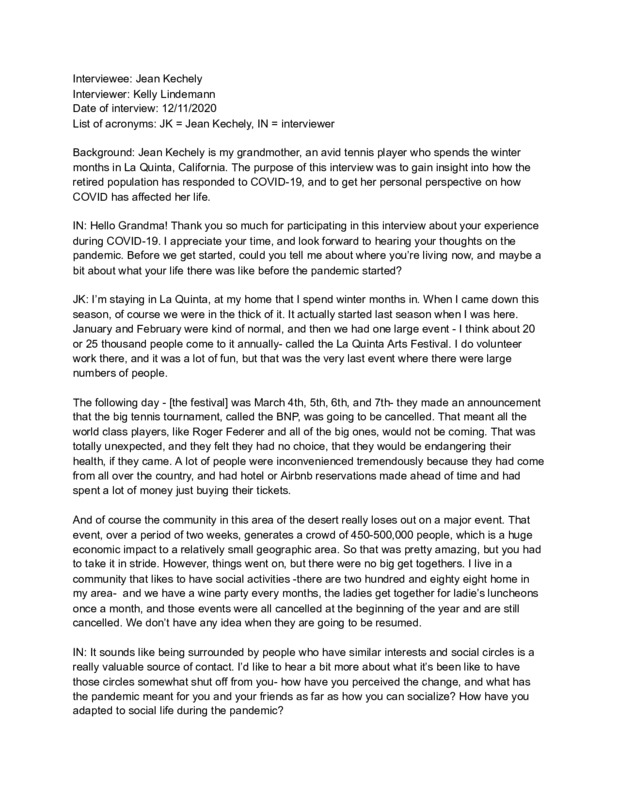 2020-12-11
2020-12-11Interview with Jean Kechely
Interviewee: Jean Kechely Interviewer: Kelly Lindemann Date of interview: 12/11/2020 List of acronyms: JK = Jean Kechely, IN = interviewer Background: Jean Kechely is my grandmother, an avid tennis player who spends the winter months in La Quinta, California. The purpose of this interview was to gain insight into how the retired population has responded to COVID-19, and to get her personal perspective on how COVID has affected her life. IN: Hello Grandma! Thank you so much for participating in this interview about your experience during COVID-19. I appreciate your time, and look forward to hearing your thoughts on the pandemic. Before we get started, could you tell me about where you’re living now, and maybe a bit about what your life there was like before the pandemic started? JK: I’m staying in La Quinta, at my home that I spend winter months in. When I came down this season, of course we were in the thick of it. It actually started last season when I was here. January and February were kind of normal, and then we had one large event - I think about 20 or 25 thousand people come to it annually- called the La Quinta Arts Festival. I do volunteer work there, and it was a lot of fun, but that was the very last event where there were large numbers of people. The following day - [the festival] was March 4th, 5th, 6th, and 7th- they made an announcement that the big tennis tournament, called the BNP, was going to be cancelled. That meant all the world class players, like Roger Federer and all of the big ones, would not be coming. That was totally unexpected, and they felt they had no choice, that they would be endangering their health, if they came. A lot of people were inconvenienced tremendously because they had come from all over the country, and had hotel or Airbnb reservations made ahead of time and had spent a lot of money just buying their tickets. And of course the community in this area of the desert really loses out on a major event. That event, over a period of two weeks, generates a crowd of 450-500,000 people, which is a huge economic impact to a relatively small geographic area. So that was pretty amazing, but you had to take it in stride. However, things went on, but there were no big get togethers. I live in a community that likes to have social activities -there are two hundred and eighty eight home in my area- and we have a wine party every months, the ladies get together for ladie’s luncheons once a month, and those events were all cancelled at the beginning of the year and are still cancelled. We don’t have any idea when they are going to be resumed. IN: It sounds like being surrounded by people who have similar interests and social circles is a really valuable source of contact. I’d like to hear a bit more about what it’s been like to have those circles somewhat shut off from you- how have you perceived the change, and what has the pandemic meant for you and your friends as far as how you can socialize? How have you adapted to social life during the pandemic? JK: Well actually, I would have to tell you that I feel very minimally impacted due to being a retired person and in excellent help, which enables me to engage in the normal activities that I enjoy, which I would describe as healthful recreation. I still play tennis three times a week, and my tennis club had to make a couple of changes. They require all of us members to wear a mask when we enter the property, but once we’re on the court and actually playing then we can remove our masks. Another big change was that we could not invite any guests to the club; that was something that we all enjoyed doing, but they felt that they couldn’t allow that. So, that’s how it still is right now. IN: As far as your companions in the club, are you all fairly like minded in your reactions, or are there differences in people’s opinion on how to respond to the virus? JK: Oh, there are many, many differences. Some people feel that they just don’t know what to believe about it. They don’t know what advice to follow, so anything that is actually mandated by the government, then we have to follow that to be good citizens. Several of the women with whom I play would have an adult child tell them “Well Mom, I don’t think you should be playing any longer because you have no control over where those people are going, or with whom they’re associating”. So, I’ve had a couple of players that I know stop playing, though now they’re back. There are a lot of people from Canada who are members of my tennis club. As soon as this started happening, I’d say around February, they left quickly to return to Canada because they were afraid that the borders would be closed down. This year almose none of them have come back, and the composition of our membership is greatly reduced and very changed. There is one Canadian couple who did fly down, quarantined for two weeks and had their car shipped down, which they’d never done before. Around here, a lot of the women are middle aged, fifty or older, and I am considerably older. Some of them didn’t even feel comfortable visiting each other’s homes, but some were so bored and needed socialization since they couldn’t do their regular activities that they were willing to go to somebody else’s house here in the neighborhood. I have a couple of friends who come over once a week to play Rummikub or Scrabble. One of my good friends has been volunteering for eleven years as an usher for the McCallum Theatre. They get top entertainment for very short runs, maybe only a weekend or an evening, but they have top entertainers like Rhonda Fleming, for example. She is dreadfully missing the wonderful entertainment that she got to see, and misses the people with whom she used to work as an usher. There’s still no idea of when they will be able to resume, since entertainment contracts like those are created at least a year ahead of time. That’s been a big loss for her to not have that. She’s someone who comes over and plays Rummikub or Scrabble with me. IN: It seems quite valuable to have a close circle of friends that you can get together with. Our social lives are very important and have a significant impact on our mental health. JK: And especially as you get older, they say that socialization is very important to help maintain your psychological health. I feel very fortunate that I can do this, and am very happy that there are some women in the area willing to go out and go to somebody else’s house. But I know there are a few who still don’t feel comfortable leaving their own homes, and it must be very difficult to them. IN: I’m interested in your perspective on the relative levels of safety and comfort that people have around protecting themselves from the virus. From what I’ve heard, the virus is more dangerous to people who are immunocompromised or older. I’ve seen a few submissions to the Journal of the Plague Year that center around older people who have a lot of apprehension of the virus, and many of them have taken drastic measures to protect themselves. As someone who is older, do you consider yourself to be vulnerable to COVID, and what is your attitude towards the virus? JK: Well age-wise of course I am vulnerable, but fortunately I do not have any underlying immune problems and am grateful for having such good health. I realize how difficult this pandemic has been for so many American families- parents are trying to keep an income stream, many of them have school-aged children at home and have to supervise their schoolwork, and try to keep the family engaged in outdoor activities. It’s almost too much to expect of a great many families, especially when it’s gone on since February or March and accompanied by harsh lockdown measures. A lot of people that I talk to are not certain that the advice they were given at the beginning [of the pandemic] has been accurate. They feel that a lot of the advice handed down by government bodies has been inaccurate. But you can’t blame them, since this is the first time such a thing has happened in our lifetimes, and everybody is having to go carefully and listen to what is advised. If you are a responsible person you listen to the advice, since these are the people who are in the NHI and the CDC and we should listen to what they think is best. A lot of people say, “We’ve been misled and don’t know what to believe”. I think with the mask thing there’s been a lot of resistance, and of course when you have your president so often appearing in public without his mask, that sends a poor message. I think that wearing a mask is a very small thing to ask of a person, whether it’s going to help other people or yourself- it’s such an easy thing and we should all be willing to do it. IN: I think so too, and on that note would like to bring up how the virus has been politicized, especially as it’s occurred during an election year, and how our governmental bodies have taken strategic stances on it. If you recall, back in March there were conflicting news articles about the subject of wearing a mask- some of then claimed that wearing one would increase your chances of getting it, or make it harder for medical workers to get the masks they needed. There was so much conflicting advice in the news, and I think that really impacted people’s perception of the virus and made it much harder to for them to know how to respond. Living in a community where people are from different areas and backgrounds must have given you an interesting view into the different ways that people perceive the virus. JK: I do hope that we can have this vaccine soon, but even with that there are many people who say that they won’t get the vaccine until its proven to be safe and effective. And I do understand that, but am glad that it will be made available first to healthcare workers and elderly people in nursing homes. IN: On that topic, some of the stories coming from nursing homes are heartbreaking, especially since they’ve had to be strict about limiting visitors. Living in isolation is hard for anyone, but living in a community away from your friends and family must make it a level of magnitude more difficult. JK: Oh yes. I have one of my friends whose husband is- was- in an Alzheimer’s care facility, and she would visit him every Tuesday and Thursday for over a year. When COVID-19 hit, the facility would not allow any visitors, even family. That was very hard for her, but they were able to arrange telephone and Zoom visits so she could actually see him. He passed away before I was abel to come down for the season, and I was very, very saddened for her. IN: The amount of suffering that people have had to endure is astonishing, and I hope that having a record of people’s experiences during the pandemic can help us to remember what people went through and maybe help us do better in the future. I sincerely appreciate that you’ve participated in this interview to share with the Journal of the Plague Year, and thank you so much for having this conversation with me. -
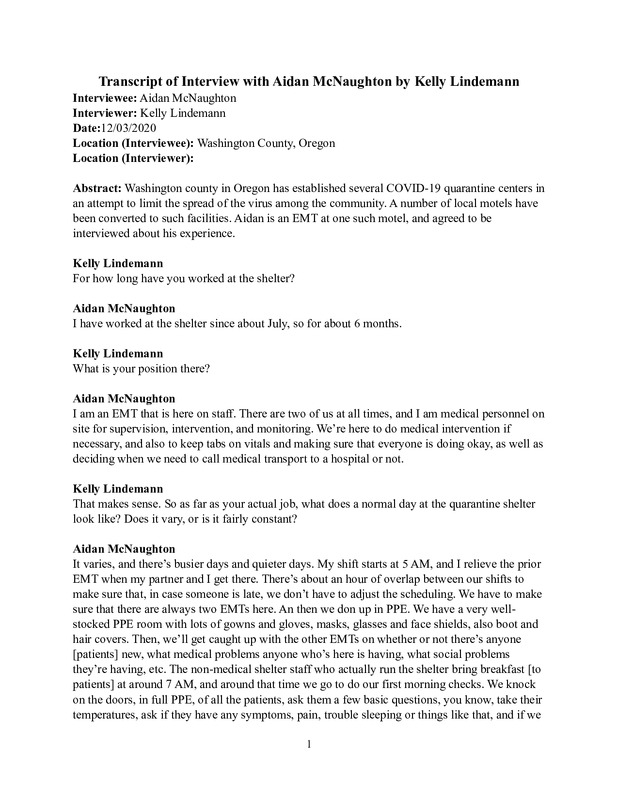 12/03/2020
12/03/2020Aidan McNaughton Oral History, 2020/12/03
Washington county in Oregon has established several COVID-19 quarantine centers in an attempt to limit the spread of the virus among the community. A number of local motels have been converted to such facilities. Aidan is an EMT at one such motel, and agreed to be interviewed about his experience. -
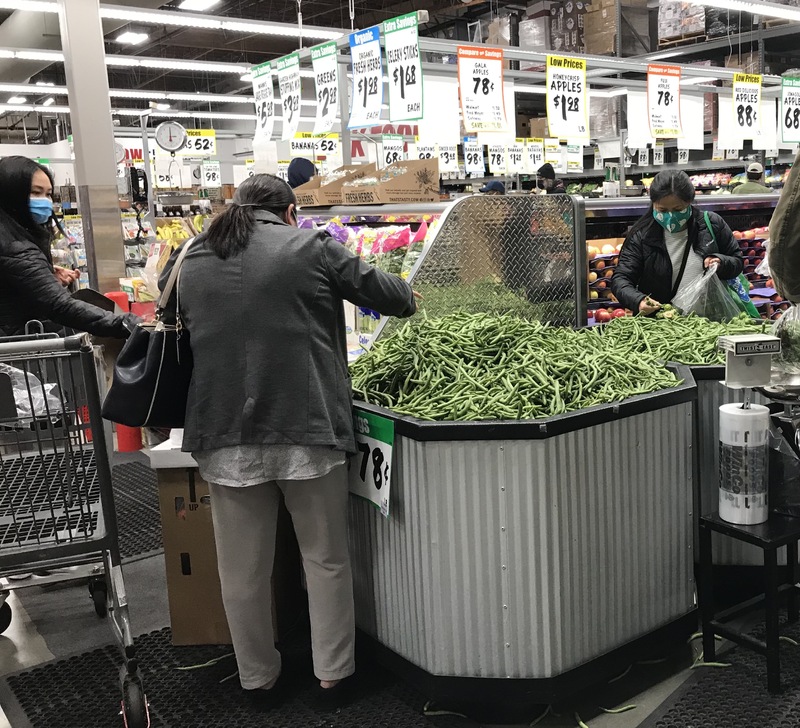 2020-11-25
2020-11-25Unimpressive WinCo Precautions
While going grocery shopping for Thanksgiving, I was surprised to see this green bean display that people were going through with uncovered hands. Though most of the bulk goods at WinCo have been partitioned into pre-packaged bags, some of the produce is still open for people to touch. I know that COVID isn't highly transmissible via surface contact, but it was still off-putting to see people touching food that others would eat. I'll be washing my vegetables more thoroughly after seeing this! -
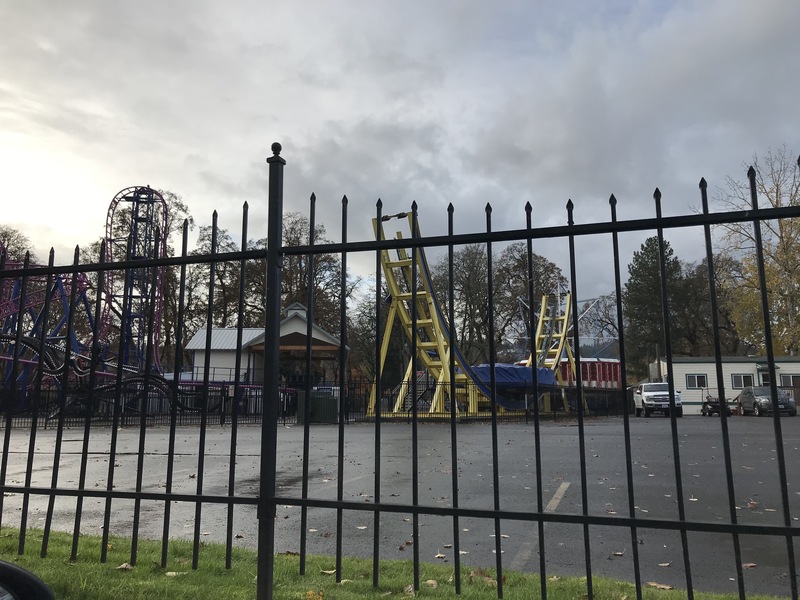 2020-11-24
2020-11-24Empty Oaks Amusement Park
Oaks Amusement Park in Portland, Oregon has been closed for the 2020 season, and looks eerie and empty. It looks abandoned and gives off mega haunted Scooby Doo type vibes. The park petitioned Governor Kate Brown for permission to reopen, but have not received permission as of November 2020. -
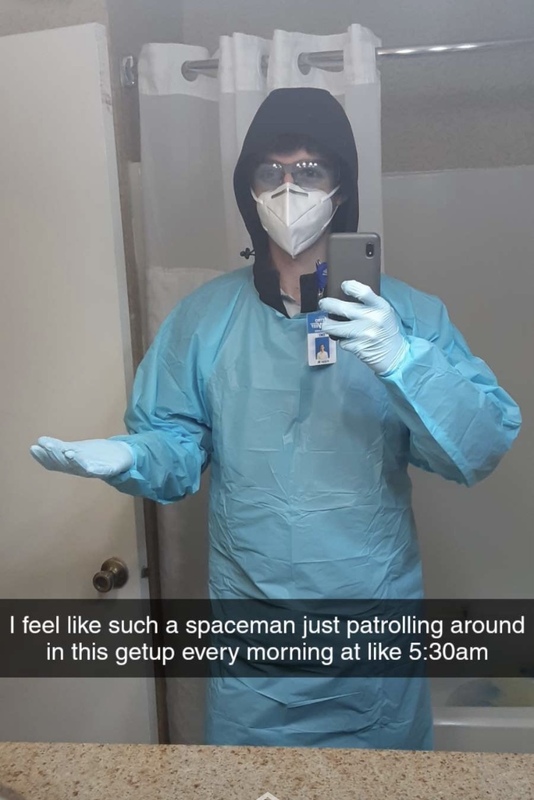 2020-10-23
2020-10-23Voluntary Isolation Motel EMT
Several counties across Oregon have coordinated with local motels to establish voluntary isolation shelters in an attempt to curb the spread of COVID-19. Each location is staffed with city personnel to manage admittance and discharge, while EMTs on staff conduct routine medical monitoring to patients. My boyfriend works in one of these shelters, and sent me this picture of him in his full PPE getup before making morning rounds. The shelter's capacity varies a lot week by week, and anywhere from 1-20 COVID positive patients may be staying there at any given point. This particular motel intakes prisoners who need to do a 2 week quarantine before being released, but also serves non-incarcerated people who have tested positive. -
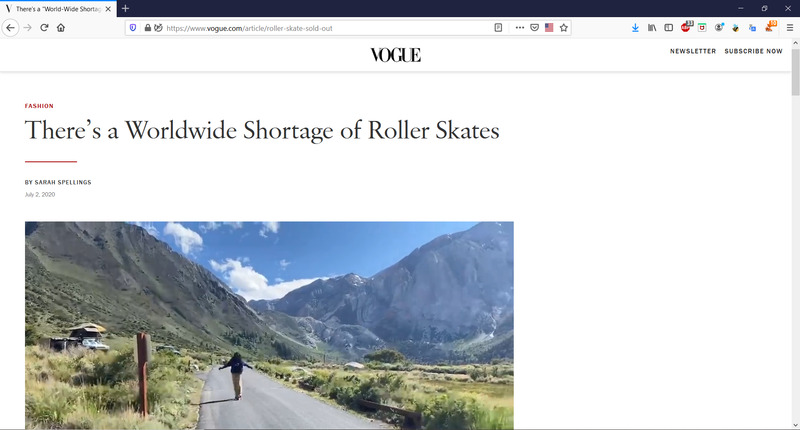 2020-07-02
2020-07-02World-Wide Roller Skate Shortage
Roller-skating has recently become a viral trend, to the point that major skate companies have been sold out for weeks. While the hobby has been alive and well within Black and skate communities, it has had a massive resurgence in popularity in the mainstream. -
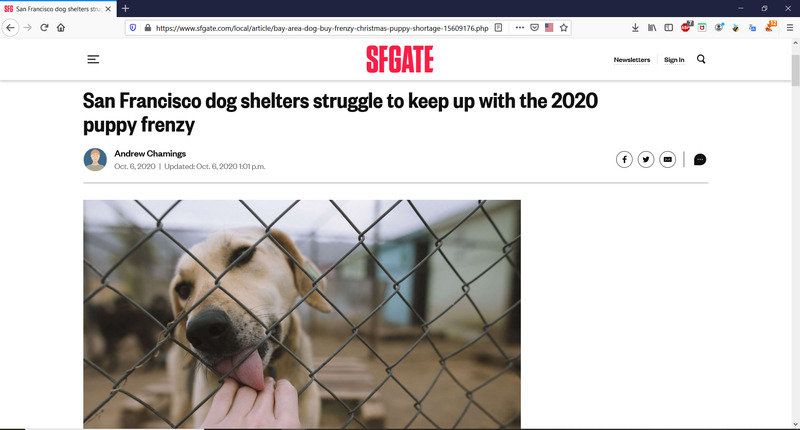 2020-10-06
2020-10-06Pet shortage in SF
The COVID-19 lockdown has forced many people into social isolation, and also provided the free time necessary to care for and train new pets. The resulting surge in dog adoptions has led to a shortage of adoptable animals in San Francisco shelters, and the pet sales industry made a record-breaking $100 billion this year. Since puppies can no longer be commercially shipped, a company called PuppySpot has taken to chartering private jets to transport animals bred in the Midwest to the Bay Area. With no end to the pandemic in site, demand has continued to rise. -
 2020-04-12
2020-04-12The Last Supper over Zoom
Meme of Jesus on a Zoom call with the disciples at the Last Supper. -
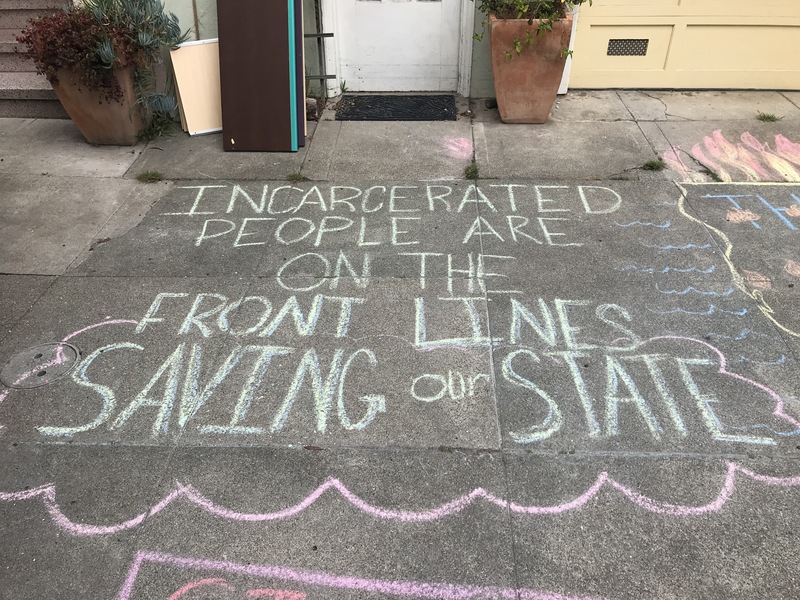 2020-08-25
2020-08-25Sidewalk art about inmates fighting California's fires
There have been over 8,000 fires in California during 2020, and CalFire has been short staffed due to COVID-19 lockdowns at prison facilities. Inmates and typically make up 40% of the CA's firefighters, and this piece of sidewalk art drew attention to the incarcerated people risking their lives to stop the fires. -
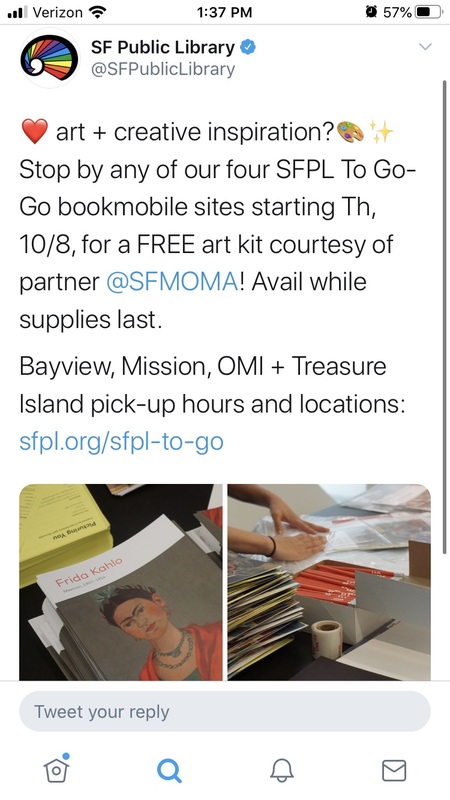 2020-10-08
2020-10-08SF Public Library + SFMOMA giveaway
SF Public Library has partnered with SFMOMA to provide free art kits at mobile library locations. I live in the city, and thought this was a neat way for the library to engage with people while their branches are closed. -
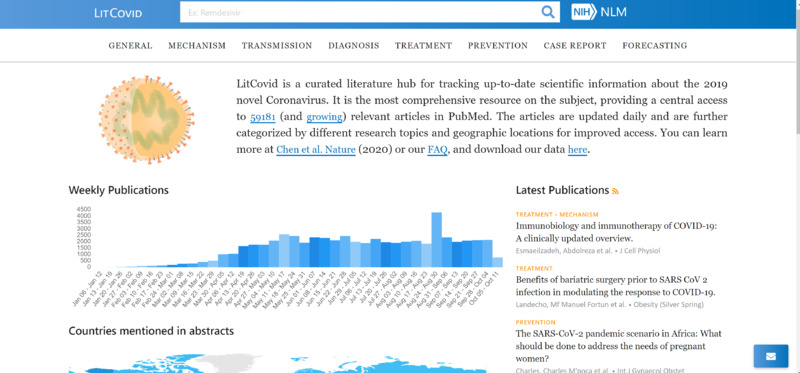 2020-10-08
2020-10-08LitCovid- open access database to new and peer reviewed literature
LitCovid is a website created by the NIH to provide free access to all academic papers and studies published to PubMed about COVID-19. The database makes it easy to search for specific types of studies, and is broken down into different categories (such as mechanism, transmission, prevention, and forecasting). It is quite jargon-heavy since it is a collection of academic papers, but can be really useful for learning more about the disease. -
 2020-09-09
2020-09-09Smoke over the Pacific Northwest
Flying from Portland to San Francisco on September 9th, the skies below were visibly smoky. It was hard to distinguish normal fog from smoke from the fires, but two huge plumes of smoke can be seen in the time-lapse. The air smelled like smoke when I took off from Portland, but was much worse in San Francisco- the sky was orange and visibility was greatly reduced. -
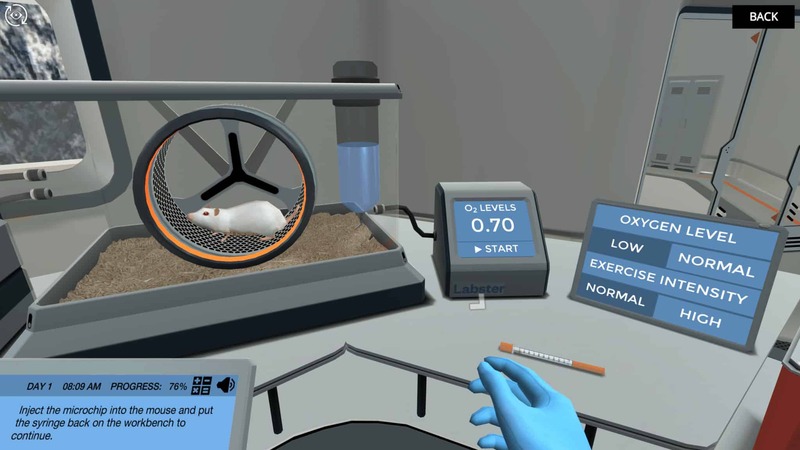 2020-08-30
2020-08-30Virtual labs feel like a bad video game
I'm currently adjusting to virtual lab for an upper-division physiology course, and my class is using a program called Labster for simulations. Picture a 2010's era, first-person video game where you are walked through 'levels' of the lab by a floating robot overlord called Dr. One. You get to put on a virtual lab coat, use a virtual iPad, and interact with virtual lab equipment. I've done experiments on computerized lab-rats, teleported into mitochondria, and clicked my way through the Krebs cycle. It feels very dystopian and unsettling, and would be funny if I wasn't being charged full tuition for what boils down to a Portal-2 knock-off without the cool aliens. Sometimes it's nice not having to commute to school. But mostly, I miss real lab and the feeling that I'm learning something meaningful by being in class. -
2020-08-20
Portland Protests During COVID-19
The videos that I am sharing are from the Portland Protests. I feel compelled to share them because protests at this scale are unprecedented in their diversity, longevity, and turnout, and may represent a social tipping-point precipitated by the dual economic and health crises imposed by COVID-19. Before COVID-19, I had planned to spend Spring Break visiting friends in Portland, Oregon. Midway through the break, my university moved classes online and I had the opportunity to stay in Portland for 5 months. On May 25th, the murder of George Floyd by Minneapolis police sparked national protests against systemic racism and police brutality. The Portland protests were especially large and active, which garnered significant media coverage and led to deployment of federal agents to the city. In the midst of a pandemic, when so many healthcare workers found themselves without adequate PPE, police departments across the country were armed with seemingly limitless munitions and riot gear. Tear gas, pepper spray, sonic weaponry, batons, and riot shields were used against demonstrators, whose defenses were composed of homemade shields, leaf blowers, traffic cones, and water bottles. Yet he crowd still showed up at the Justice Center every night, and many are still there after nearly 4 months. These protests are unprecedented, and have caused many Americans to adopt radical stances against racist and unaccountable policing, and we would be remiss not to document them as part of the Plague Year.
